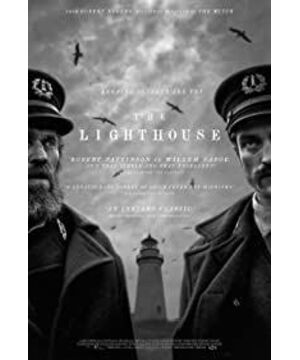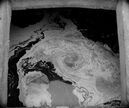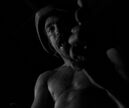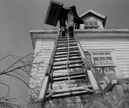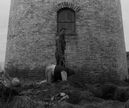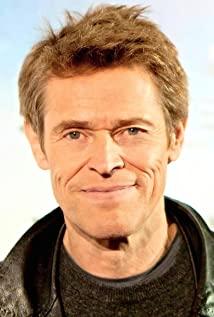Robert Eggers, once heard a little about his "The Witch", no matter what the performance of "The Witch", whether Robert intentionally or unintentionally, this "Lighthouse" alone is enough to claim that he has inherited H on the screen. The mantle of P. Lovecraft. After absorbing richer movie elements, the myth of Cthulhu reappears in the new century with unprecedented vitality.
Let's talk about things other than Cthulhu in this film first. The most impressive and surprising scene is the scene of Old Tom chasing the so-called Tommy Howard with an axe. This scene is similar to Jack in "The Shining" The picture of chasing his son in the snow is exactly the same. The plot of this film, the human spirit is gradually disintegrated by some factors in a closed space, and then the process of "slowly but strongly falling into madness" is also roughly the same as "The Shining". While Lovecraft's writing was clearly influenced by Shakespeare and Edgar Allan Poe's long, flamboyant sentences, the Poe-esque side profile of the psychic activity is also to be commended, Howard thought. When stealing the key to the lighthouse beside the sleeping old Tom, through Robert's superb interpretation, we can capture the influence of the meticulous psychological changes such as "The Leaked Heart", "The Pit and the Pendulum" on the film, in fact This method of psychological analysis and evolution is very instructive to the skills of composition and camera use, and it is believed that early Hitchcock's films and Saul Bass's storyboards were deeply influenced by this.
"The oldest and strongest emotion of man is fear, and the oldest and strongest fear is the fear of the unknown." - Supernatural Horror in Literature (1927), H.P. Lovecraft special
It is precisely because of Lovecraft's deep understanding of human fear that he will focus the horror elements on folk culture, because they are small, mysterious, primitive and unknown. Looking through his works, pagan worship is almost every The plot of the story is bound to appear. Especially evident in Dagon, The Shadow of Innsmouth Town, and the famous Call of Cthulhu, The Lighthouse clearly shares many similarities with Dagon, such as the superstition of the ocean. Similar to the collapse of the protagonist, the mermaid sculptures in the film also find similar plots in these chapters.
One of the most important elements of the film, and the reason for its purest Cthulhu style, is the question that runs through the film: what's in the lighthouse. At the end of the film, Howard walks towards the lighthouse, which ultimately ushers in destruction. This clue takes us back to the bizarre and dark world that Lovecraft built.
"In my opinion, there is no more benevolent place in the world than the inability of the human mind to comprehend all its contents. We live on a peaceful island called ignorance, surrounded by an endless black ocean, and we are not Time to set sail. Science—every kind of science—struggles in its own direction, so little harm is done; but sooner or later, some seemingly unrelated piece of knowledge will open Horrific visions of reality revealing the horrific situation in which humanity is inhabited, and we will either go mad or flee from this deadly light into a new dark age, where we can enjoy the silence and safety." - Cthulhu's The Call, H.P. Lovecraft
Different from Stephen King's idea of idealism developed from change, Lovecraft focuses on the "indescribable" fear brought about by the insignificance of human beings in the boundless space and time, the so-called "cosmic indifference". ” (cosmic indifferentism). In his opinion, the most powerful weapon of mankind is ignorance. Once this weapon is lost, the unknown darkness will shroud mankind. "Children are always afraid of the dark, and adults, sensitive to instinctual impulses, think of the hidden and unknowable worlds of strange life throbbing beyond the stars, or the The level of evil that only the nerd and the idiot can glimpse, will shudder." The film Haunted Palace (1963) was the earliest film adaptation of Lovecraft's work, and many films since then have failed to deliver the Rockwell's cosmic horror means, but there are still many good works, such as "Forbidden Zone" based on "Dagon".
However, no film has been able to accurately convey this unique horror imagery, until "Lighthouse" turned out. The design surrounded by the sea is a direct metaphor for Lovecraft's famous description of an island where Howard collapsed and died because he saw something beyond human senses and thought. This perfectly echoes Rockwell's "cosmic indifference", and the New England sailor legend echoes Lovecraft's world from afar. The protagonist's spirit is split and collapsed, the weird look and feel that permeates the whole film, and the black and white color palette. Elements have created the most successful film and television adaptation of Cthulhu in history. Although the director himself does not think this is a film related to Cthulhu, the fact is that "The Lighthouse" does show us Cthulhu's film and television works. , which is an instructive and landmark step.
All in all, "The Lighthouse" has given new possibilities to the Cthulhu mythology, and we look forward to more and more excellent Cthulhu adaptation movies in the future.
View more about The Lighthouse reviews


